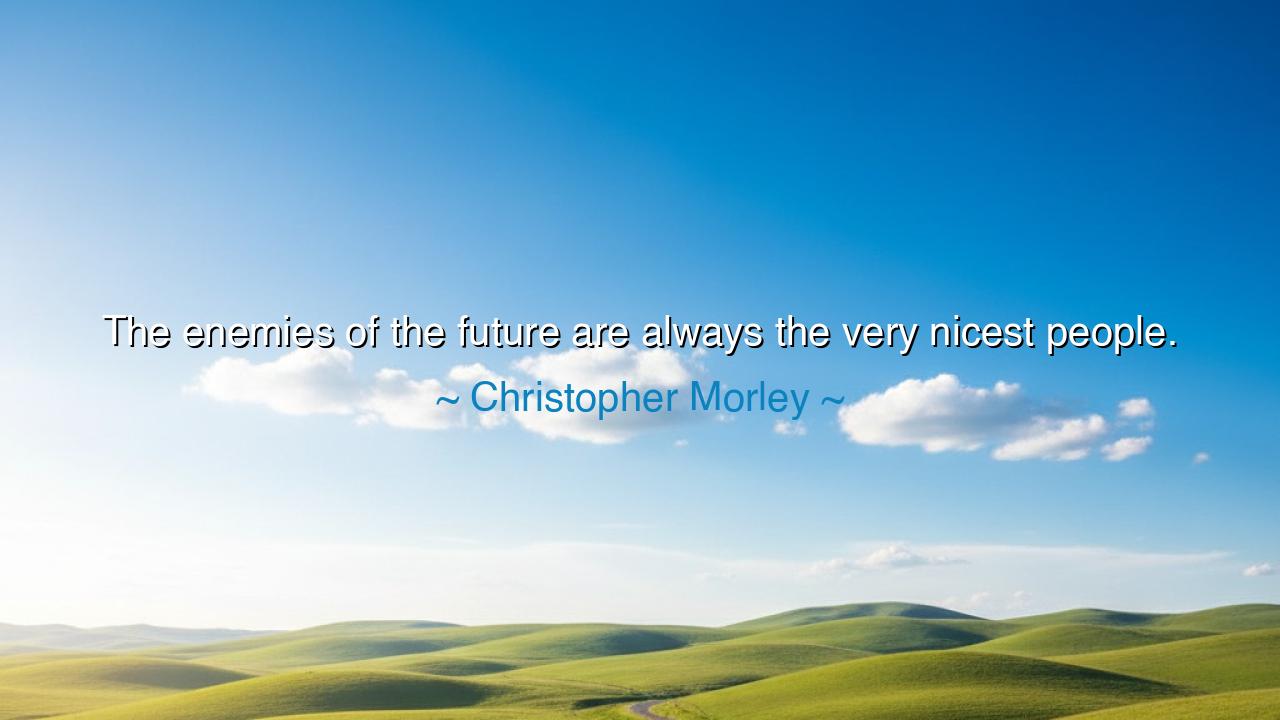
The enemies of the future are always the very nicest people.






"The enemies of the future are always the very nicest people." These words by Christopher Morley carry a profound reflection on the nature of progress and the obstacles that stand in its way. Morley suggests that those who seem the most well-intentioned or kind are often the ones who resist change, unconsciously standing in the way of advancement and the future. It is an observation that points to the tension between tradition and innovation, and how the most comfortable and safe aspects of life can often become the biggest impediments to growth and progress. The "nicest people" may offer comfort and stability, but they often fear the uncertainty of what lies ahead, and in their desire to preserve the status quo, they may inadvertently hinder the potential of the future.
This truth echoes the ancient wisdom of Heraclitus, the philosopher who believed that change was the fundamental law of the universe. He famously said, "You cannot step into the same river twice," signifying that life is in constant flux, and that true growth comes from embracing change, not clinging to the past. Heraclitus understood that those who resist the natural flow of change—whether out of fear, comfort, or habit—become enemies of progress. Like the "nicest people" Morley describes, they may have the best of intentions, but their reluctance to move forward holds humanity back from the great transformations that await in the future.
History is full of examples of such enemies of the future, individuals or groups who, though well-meaning, stood in the way of transformative progress. Consider the case of the Luddite movement in the early Industrial Revolution. The Luddites were workers who, fearing the loss of their livelihoods to new technologies, destroyed the machines they believed threatened their way of life. In their resistance to progress, they believed they were protecting their future, yet their actions were ultimately a rejection of the very advancements that would elevate society to new heights. Their well-intentioned opposition to technological change served only to delay the inevitable, and they became a symbol of how the nicest people, when driven by fear and attachment to the past, can hinder progress.
Similarly, in the ancient world, the Roman Senate often resisted reforms that would have modernized the political system. Figures like Tiberius Gracchus sought to introduce laws that would help the common people, but their attempts were met with fierce opposition from the elite of Roman society. These senators, while undoubtedly loyal to Rome and its traditions, feared the changes that Gracchus’ reforms would bring. In their efforts to preserve their privileges and status, they became the obstacles to a more equitable future. Like the “nicest people” Morley speaks of, they were unwilling to let go of the past in favor of a better future.
The lesson in Morley’s quote is a warning to recognize that progress often requires difficult decisions and the courage to move forward into the unknown, even at the cost of comfort and familiarity. The “nice people”—the ones who wish no harm and seek only to preserve what is familiar—are often the ones most likely to resist change, not out of malice, but out of a deep-seated fear of what might be lost. They may cling to the familiar, but in doing so, they deny themselves and others the opportunity to experience the new and transformative possibilities that lie ahead.
For example, Martin Luther King Jr. faced resistance not only from overt enemies but also from well-meaning individuals who, though not hostile to the idea of equality, feared the disruption that the civil rights movement might cause to the status quo. These individuals, the "nicest people," were often unwilling to embrace the necessity of change, preferring to preserve the comfort of their current way of life. King’s leadership, however, demonstrated that true progress requires bold action, even in the face of opposition from those who wish only to maintain peace by avoiding the discomfort that change brings. King understood that sometimes the most difficult actions are necessary to bring about a more just and equal society.
The lesson we can draw from Morley’s words is to challenge ourselves and our communities to look beyond the comfort of the present. We must question the belief that preserving the way things are is always the best course. Progress often requires courageous decisions that disrupt the familiar and push us into unchartered territory. Like Heraclitus and Martin Luther King Jr., we must embrace change and growth, recognizing that the future is shaped by those who are willing to step forward into the unknown, regardless of how comfortable the past might seem.
In our own lives, let us take the wisdom of Christopher Morley and the ancients to heart. Let us not be the nicest people who, in our desire to protect the familiar, hold back the future. Instead, let us embrace the discomfort of change, understanding that true growth often comes at the cost of stability. Let us be the ones who shape the future, not by clinging to what we know, but by daring to move forward, with boldness and conviction, into the possibilities that await.






AAdministratorAdministrator
Welcome, honored guests. Please leave a comment, we will respond soon